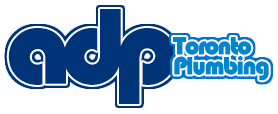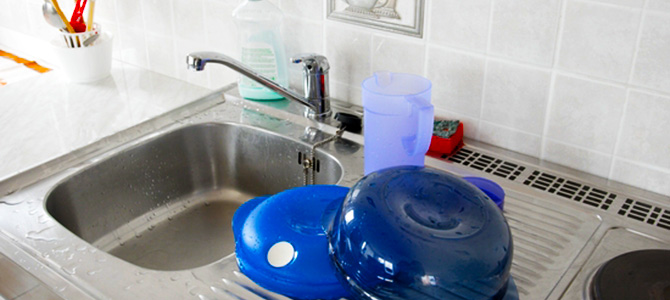Your kitchen is the heart of the home, and you love its friendly atmosphere and the delicious smells that emanate through the house from cooking. You might feel slightly less enthusiastic about your kitchen plumbing drains, however, and when they give trouble, the whole family is affected. Here are some tips for ensuring that your drainage system stays healthy and clog-free.
Tip #1: Dispose of waste elsewhere
Leftover food such as rice grains, breadcrumbs and the dregs of oil from a grill pan are the prime culprits when it comes to blocked drains. It’s a common misconception that “a few crumbs won’t hurt” and we regularly wipe the kitchen counters down and then rinse out the cloth, without thinking about how much is actually going into the outlet. The buildup over months and years, however, can blog the hardiest Toronto kitchen drain.
In addition, to avoid odors we often rinse out used tin cans before disposing of them, and the remains of the contents also go – you guessed it! – into your plumbing systems drains! The toilet is the only facility in the average home that is capable of handling solid waste, so why not use it? Fill that empty tuna can with water, swirl it around and tip it out into the toilet instead of your kitchen sink.
Tip #2: Catch the bits
Install a kitchen sink strainer, available at most hardware stores for less than $50. This catches any food remnants that are big enough to cause damage to the plumbing drains, and if you use a removable one you can tip it out easily into the garbage after washing. Look for one with relatively fine holes, because this will allow fewer pieces to fall through than one with large holes.
Tip #3: Clean it regularly
No, we don’t mean you have to get down under the sink and fiddle with the fittings of your drains. We mean pour some household dish soap mixed with boiling water down the drain once a week or so. Baking soda is a popular drain cleaner, as is baking soda mixed with vinegar, which creates a fizz that works well to clean the drain. You can also try bacteria-based enzyme cleaners available from health food stores to “eat” the clogged waste off the interior pipe surfaces safely.
Tip #4: Avoid corrosive chemicals
We’ve been brought up to believe only the strongest acid and other powerful industrial chemical drain cleaners will do the job, and often these are the most dangerous substances found in a home. Well, you don’t need them. Firstly, these cleaning fluids tend to be corrosive, and with the aging pipe infrastructures and drains in Toronto homes, the last thing you need to do is cause damage inside the pipes.
Tip # 5: Keep it smelling fresh
Keep your kitchen sinks’ drains smelling fresh by pouring concentrated lemon juice, vinegar or bleach into the drain every two weeks. Flush the drain thoroughly afterward with boiling water. If you find the drain continues to give off unpleasant odors, check the automatic garbage disposal if you have one, or the u-bend under the sink for manual drains. You may find an obstinate piece of garbage is stuck and decomposing in the drain, and no amount of freshening up will remove those odors.
Contact your local Toronto plumbers today for a camera inspection of any kitchen plumbing drains that have been giving you problems. We’ll give you a full report and estimate of the costs for repairs that will prevent future issues.


I really like the tip about boiling water, I never thought of that it’s so easy to do.. I am for sure going to be adding that to my weekly super house clean. I’d suggest against using bleach down the drain though that’s probably not very good for the environment I wouldn’t think!
I really like the tip about boiling water, I never thought of that it’s so easy to do.. I am for sure going to be adding that to my weekly super house clean. I’d suggest against using bleach down the drain though that’s probably not very good for the environment I wouldn’t think!
I really like the tip about boiling water, I never thought of that it’s so easy to do.. I am for sure going to be adding that to my weekly super house clean. I’d suggest against using bleach down the drain though that’s probably not very good for the environment I wouldn’t think!
Lemon is a great way to freshen the sink! If you have a garbage disposal – cut a lemon in half and grind each half separately. The disposal will release some of the oils from the lemon peel which deodorize the disposal and make the whole kitchen smell clean.
Lemon is a great way to freshen the sink! If you have a garbage disposal – cut a lemon in half and grind each half separately. The disposal will release some of the oils from the lemon peel which deodorize the disposal and make the whole kitchen smell clean.
Lemon is a great way to freshen the sink! If you have a garbage disposal – cut a lemon in half and grind each half separately. The disposal will release some of the oils from the lemon peel which deodorize the disposal and make the whole kitchen smell clean.
You will find water heaters in most of the houses today. Water heaters are very useful, because you can enjoy a warm shower when the weather is extremely cold outside, and it is all the more better if it is instant hot water heater, because you get hot water instantly as soon as you open the pipe instead of waiting, shivering with cold, for the water to heat up. If you haven’t installed a water heater in your bathroom, you should do so before winter arrives. To guide to regarding best water heater, and it’s installation, you should call for a local plumber. Plumbers not only install and repair water heaters, but also install pipes, bathroom fixtures etc.
You will find water heaters in most of the houses today. Water heaters are very useful, because you can enjoy a warm shower when the weather is extremely cold outside, and it is all the more better if it is instant hot water heater, because you get hot water instantly as soon as you open the pipe instead of waiting, shivering with cold, for the water to heat up. If you haven’t installed a water heater in your bathroom, you should do so before winter arrives. To guide to regarding best water heater, and it’s installation, you should call for a local plumber. Plumbers not only install and repair water heaters, but also install pipes, bathroom fixtures etc.
You will find water heaters in most of the houses today. Water heaters are very useful, because you can enjoy a warm shower when the weather is extremely cold outside, and it is all the more better if it is instant hot water heater, because you get hot water instantly as soon as you open the pipe instead of waiting, shivering with cold, for the water to heat up. If you haven’t installed a water heater in your bathroom, you should do so before winter arrives. To guide to regarding best water heater, and it’s installation, you should call for a local plumber. Plumbers not only install and repair water heaters, but also install pipes, bathroom fixtures etc.
Another common problem is blocked toilet bowl. This is due to negligence on your part. Children’s nappies, sanitary napkins, or sometimes even children’s toys, are common causes of a blocked toilet. You might not know how to clear a blocked toilet, so the best thing will be to call plumbing service, who will help you the clear the toilet blockage.
Another common problem is blocked toilet bowl. This is due to negligence on your part. Children’s nappies, sanitary napkins, or sometimes even children’s toys, are common causes of a blocked toilet. You might not know how to clear a blocked toilet, so the best thing will be to call plumbing service, who will help you the clear the toilet blockage.
Another common problem is blocked toilet bowl. This is due to negligence on your part. Children’s nappies, sanitary napkins, or sometimes even children’s toys, are common causes of a blocked toilet. You might not know how to clear a blocked toilet, so the best thing will be to call plumbing service, who will help you the clear the toilet blockage.
As all tips are effective if we keep it in mind and implement in daily kitchen work.
As all tips are effective if we keep it in mind and implement in daily kitchen work.
As all tips are effective if we keep it in mind and implement in daily kitchen work.